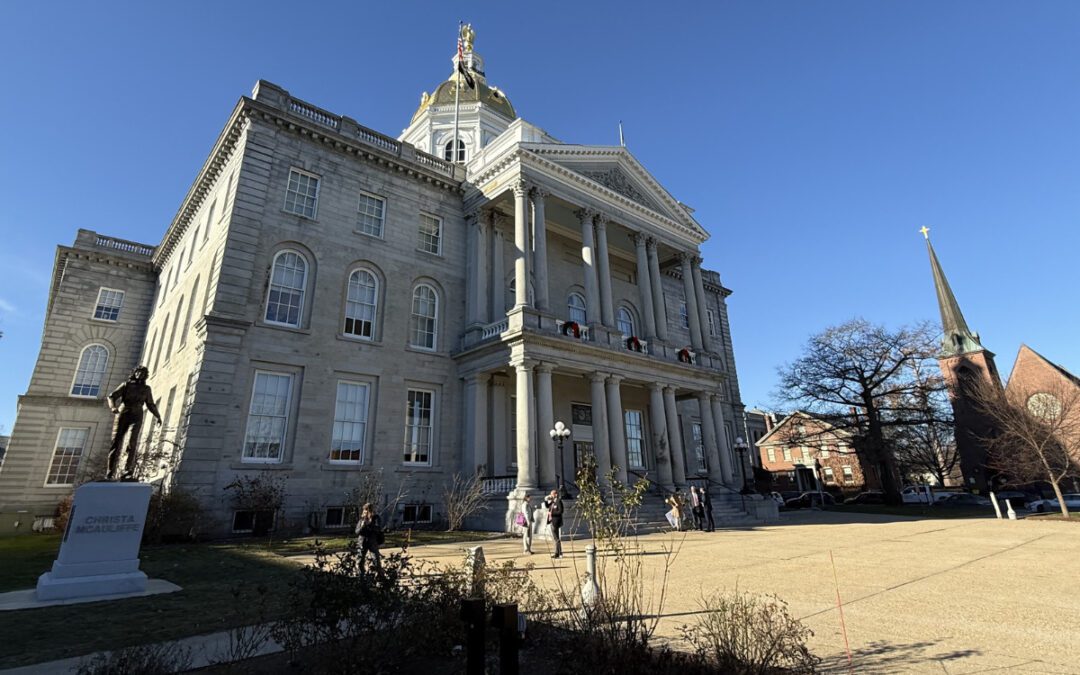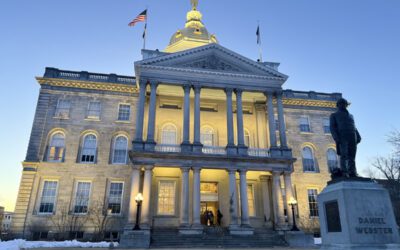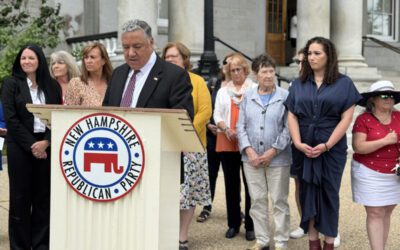
Republican candidate for governor Kelly Ayotte on Wednesday released a slate of new endorsements from current and former Members of the New Hampshire State House, with State Representative Ken Weyler, who in 2021 resigned as chair of the powerful State House finance committee after sending an email laced with COVID-19 misinformation to colleagues on the finance committee. (AP Photo/Jim Cole, File)
New Hampshire has a host of economic issues that the state’s government could address, but instead Republican politicians are talking about cutting taxes even more for big business.
House Bill 155 would bring forth another tax cut for businesses—one that would benefit larger and more profitable companies and corporations, with small businesses seeing minimal impact. Gov. Kelly Ayotte, a Republican, said in January that she wasn’t looking to lower taxes for businesses, yet state leaders in her party passed the bill in the Ways and Means Committee in early October, with all Republicans voting in favor and all Democrats opposed.
What’s HB 155? It’s a bill that would cut a tax that businesses pay on wages, dividends, and interest—not their profits. The tax cuts would start in 2026, and would put more money into the pockets of New Hampshire’s largest companies, enriching their shareholders while potentially opening up shortfalls in the state’s budget that affect public services and local property taxes.
The New Hampshire state Legislature has cut taxes several times for different things over the last 10 years. It has resulted in millions of dollars in lost revenue.
Between 2016 and 2024, business tax rate reductions have led to between $795 million and $1.17 billion less in state revenue, according to the New Hampshire Fiscal Policy Institute (NHFPI). That’s money that could have paid for teachers, road repairs, health care programs, and other state services. When the state brings in less tax revenue, it either has to cut services or ask local communities to raise property taxes to fill the gap.
Republicans have been in control of both chambers of state government since 2020.
According to NHFPI, there is no evidence that reducing taxes increases revenue, and all research using data from the state indicated that lowering tax rates did not result in enough investment to offset the revenue falling short.
The New Hampshire Department of Administrative Services projected the state would have roughly $320 million in September for the general and education funds, but fell short by around $7 million.
So the state is making less money, and Republicans are trying to reduce revenue even more instead of investing in Granite Staters.
Evidence of this emerged in June, when the New Hampshire Supreme Court ruled that the state is violating the constitution by not providing adequate funding for public schools.
“It is now incumbent upon the legislative and executive branches to remedy the constitutional deficiency that we have identified,” Justice James Bassett wrote in his opinion.
Gov. Ayotte disagreed with the court’s ruling, and didn’t give any indication that she would abide by its decision.
“The Court reached the wrong decision today,” Ayotte said in a statement.

Allegations of threats surface after contentious budget fight among New Hampshire Republicans
Public accusations of threats followed a rancorous session of the New Hampshire House after a near collapse of support for the 2026 state budget on...

NH House Republicans pass 2026 budget that raises taxes on working families, funds school vouchers and tax breaks for wealthy
The budget now heads to the State Senate for further amendments and changes. New Hampshire House Republicans voted on Thursday to pass the most...

NH Republicans vote to leave a red seat open for 19 months rather than risk a special election loss
Republicans in Salem last week voted to prevent a special election to fill a vacant seat in the state legislature, opting to leave local residents...

Op-ed: Protecting Municipal Sovereignty: Safeguarding Local Control in New Hampshire
The persistent threat to municipal sovereignty is illustrated by the extreme proposals put forth by Republicans in the House Committee on Municipal...

Op-ed: New Hampshire’s Political Engagement Paradox
The size of New Hampshire’s state legislature is quite unique among its peers, not just around the US, but around the globe. With 400 State...

NH House Republicans declare a ‘mandate’ despite receiving just 51% of vote, stack leadership with notorious legislators
The Speaker of the New Hampshire State House, Republican Sherman Packard, recently announced his legislative leadership team for the 2025-2026 term...




